Source: Light Cone Intelligence
Author: Yao Yue
Editor: Wang Yisu
Original Title: "Farewell to 'Flood Irrigation', How Should Digitalized Advertising Be Done?"
"On September 6, at the most important marketing summit in 2023, Mu Er, the general manager of the marketing department of Taotian Group's Alibaba Mom, officially announced, 'We will formally bid farewell to the era of single-channel delivery in the past and move towards a new era of one-stop cross-channel brand-effect joint operation.'"
On that day, Alibaba Mom integrated multiple products from the past and launched two new products that focus on "one-stop intelligence." More importantly, the marketing strategy and mindset are also undergoing synchronous transformation—proposing "overall operation" and "AI commercialization strategy."
In the increasingly "results-oriented" marketing trend, AI is becoming an important force driving marketing transformation.
Recently, the e-commerce marketing big data platform Youmi Cloud launched a series of AI creative tools such as "AI voiceover" and "AI script," and also proposed using AI technology to transform the "gambling mindset" of traditional marketing into an "experimental mindset."
ByteDance's Jinri Toutiao launched the "intelligent video editing" tool, and Baidu launched the new intelligent marketing platform "Qingge," which optimizes marketing solutions and advertising delivery through generative AI.
Marketing is becoming more diversified and refined. Relying solely on manpower and financial resources to improve operational efficiency has become increasingly difficult, and marketing platforms have long been seeking breakthroughs. Obviously, AI technology with the support of large models has been regarded as the key to breaking through the marketing industry.
AI technology is driving the transformation of marketing thinking and the advancement of intelligent tools, leading marketing into a new stage of complexity simplification and further improving marketing efficiency.
AI Commercial Era, Upgrading to "Digitalized" Marketing
"If digital marketing is characterized by empirical judgment based on big data and statistical experience, then intelligent marketing in the AI commercial era will clearly have characteristics of knowledge-driven, logical reasoning, and creativity," said Zheng Bo, the chief technology officer of Alibaba Mom at Taotian Group.
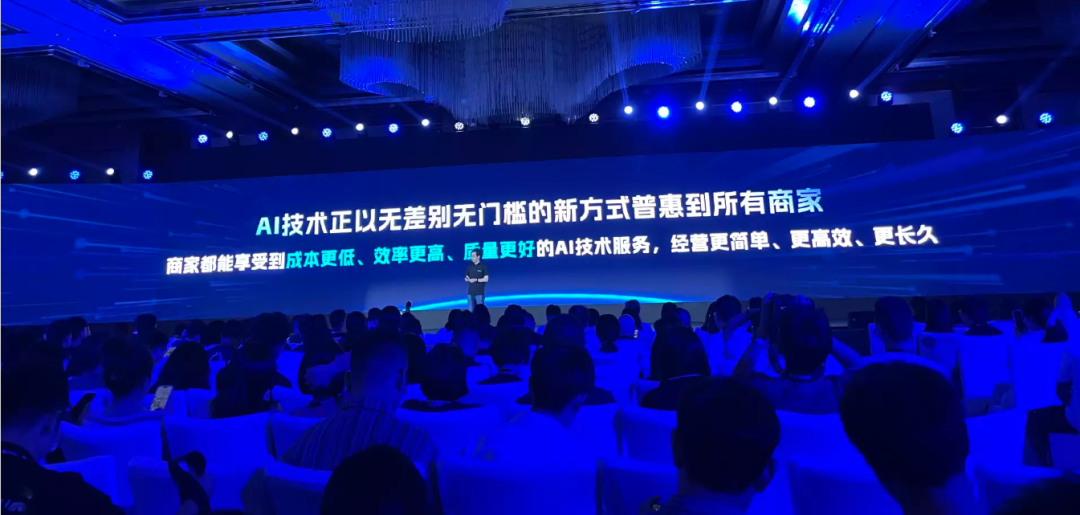
In the AI commercial era, marketing products are being refreshed and have penetrated the entire process of decision-making, creativity, and delivery.
Decision-making is the first step in the entire marketing process. At this stage, merchants need to understand industry and consumption trends in order to make reasonable marketing plans and creative ideas. However, they often face problems such as processing massive data, requiring professional capabilities, and enormous energy.
Now, generative AI can not only analyze complex data but also directly generate decision-making content.
For example, Youmi Cloud's "AI trend analysis" can analyze the common characteristics of the top 100 lipsticks sold during the 618 promotion, thereby analyzing the consumption trends of lipsticks. There is also the "Golden 3S Lines Ranking," which uses AI models to analyze and extract the most "explosive" first three seconds lines from a large amount of material for merchants to reference.
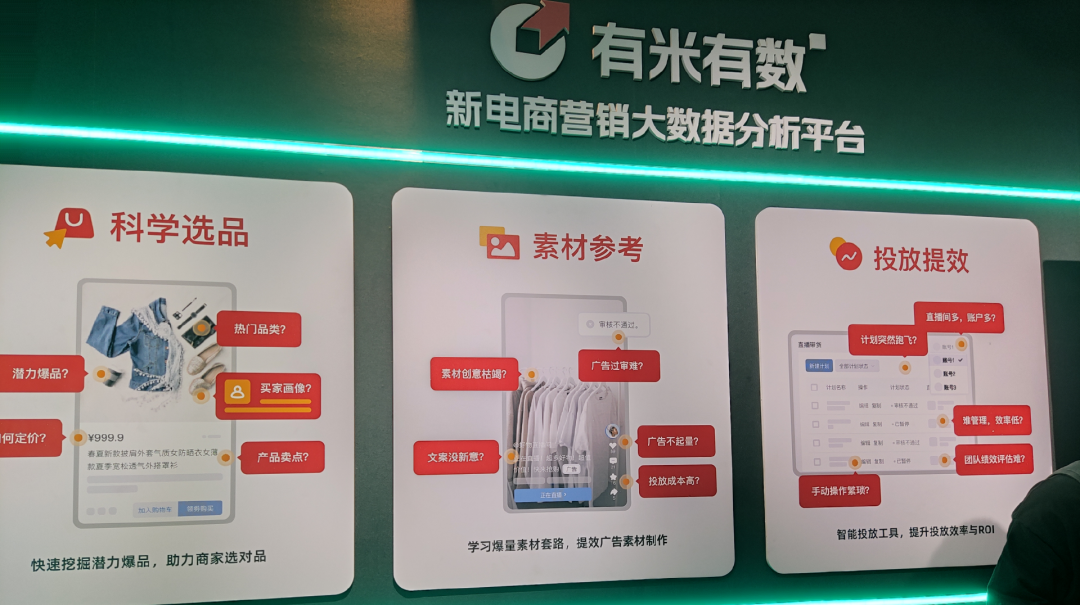
The next creative stage can be said to be the "core" of the entire marketing operation. If this stage is not well done, even if the content is "fortunately" pushed to potential buyers, it is difficult to generate transactions. Especially with the rise of content platforms, the demand for marketing content is very high, and the competition is fierce, leading to significant pressure on merchants in creative and content production.
Represented by ChatGPT, generative AI is best at "creation." Therefore, the creative stage has become the "high ground" of major marketing platforms, where basic materials such as copywriting, images, and videos in different forms can all be generated by generative AI.
Alibaba Mom's AI-generated image tool "Wanxiang Laboratory" allows merchants to upload product images and generate batches of product images suitable for different industries and scenarios within 30 seconds. The Jinri Toutiao Engine's AI "intelligent video editing" can generate 10 short videos for goods within 5 minutes by uploading three blank videos of goods. Youmi Cloud's "AI script" and "AI voiceover" only require merchants to input "product selling points," "video type," "usage scenarios," etc., and can complete a complete script and voiceover content in a few seconds to a few minutes.
Finally, in the delivery stage, this stage determines how many "0s" can be added after the "1" of creativity. Faced with multi-channel delivery, manual operation by merchants is cumbersome, and during the delivery period, someone needs to constantly monitor the situation. Otherwise, the delivery plan may go "off track," testing management efficiency.
The two intelligent marketing products released by Alibaba Mom this time—"Wanxiangtai Unbounded Edition" and "Alibaba Mom's Bailin"—are integrated and upgraded from multiple marketing products such as Direct Train, Gravity Cube, and Wanxiangtai, and both emphasize "simplified delivery."
The "Wanxiangtai Unbounded Edition" serves for effect promotion, and Taobao and Tmall merchants no longer need to operate multiple products, multiple accounts, and manage delivery budgets. The "Alibaba Mom's Bailin" for brand promotion connects the top 100 media and platforms inside and outside Taobao, enabling one-stop direct delivery across the board, and can monitor the delivery effects of different platforms in real time and optimize them at any time.
"In the past, it may have been a group of people working together to do one thing, but in the future, it may be possible for one person to independently accomplish several things," Zheng Bo said. AI will free practitioners' hands, leaving more space for the brain to explore and create with a more open mindset.
Digitalization, Breaking Through Marketing Pain Points
"In the past, brands were worried about being forgotten by consumers and pursued exposure more than conversion, but the input-output ratio could not be quantified specifically," said Chen Di, founder and CEO of Youmi Cloud. Traditional marketing methods are more like "gambling."
This "gambling" mindset is not applicable to the current environment with numerous channels in e-commerce.
The latest data shows that 62% of consumers will obtain information from more than three platforms before making a purchase. The diversification of consumer purchasing behavior determines that brands must track consumer behavior and must do so across channels. Although multi-channel delivery can increase ROI by 12.5% compared to single-channel delivery, currently only 28% of merchants can enjoy the benefits of cross-channel delivery.
"The future operation of e-commerce businesses will be more diverse and complex, with an unlimited increase in resources and investment, which cannot completely solve the problem of operation," said Yuan Mu, general manager of the advertising product center of Alibaba Mom at Taotian Group. "Flood irrigation" cannot completely solve the problem.
Marketing must undergo a fundamental transformation in thinking.
Alibaba Mom has proposed the mindset of "overall operation," which integrates products, connects data and functions, and solves merchants' overall marketing problems in a one-stop manner. Youmi Cloud also recently proposed the "experimental mindset," which involves producing different materials for different scenarios and adjusting delivery strategies in a timely manner based on delivery effects.
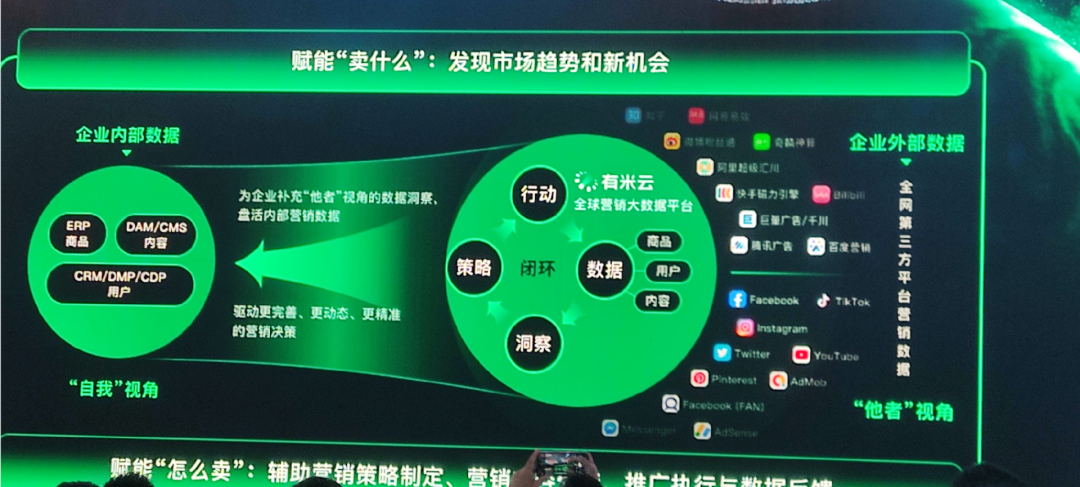
The reason why these new marketing mindsets can emerge at this time is that they are based on the same important premise—breakthroughs in AI technology.
The reason why the "gambling" mindset existed in the past is that consumer behavior for merchants is almost like a "black box," which has led to merchants being unable to accurately target audiences at the decision-making stage. Especially with numerous marketing channels, precise delivery is impossible to achieve. The final effect cannot be measured, resulting in the entire process being unable to close the loop, and the ability to accumulate information assets is also impossible.
With the advancement of AI technology, the pain points in the above-mentioned chain are being gradually addressed.
Current AI technology allows merchants to have "data-supported" decision-making. For example, Alibaba Mom's "intelligent bidding" product, based on the large model AIGB for intelligent marketing decision-making, can use precise calculations to explore more traffic that meets the needs of merchants from massive data. Moreover, in intelligent bidding, the algorithm can directly help complete multi-channel precise delivery.
This is thanks to the technical iteration of "intelligent bidding." AIGB is an optimized bidding model based on generative model construction, which differs from the reinforcement learning perspective for solving sequential decision-making problems in the past, modeling strategies as conditional generative models, thereby eliminating the complexity problems under the previous reinforcement learning perspective.
"Similar to GPT technology, applied in the field of intelligent bidding, compared to the previous generation of AlphaDog-like technology, whether from internal experiments or merchant feedback, it has been shown to enhance marketing certainty and control," explained Zheng Bo, chief technology officer of Alibaba Mom at Taotian Group.
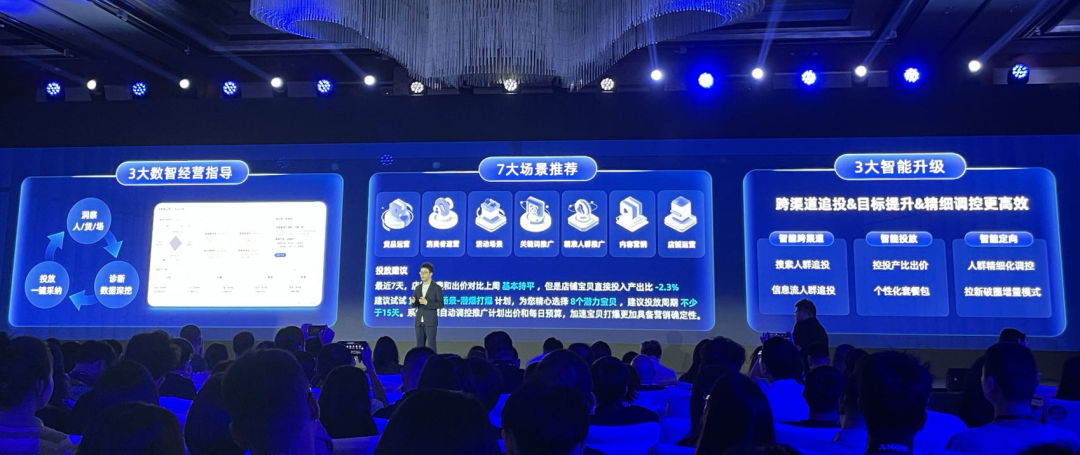
AI can also enable merchants to "solve operational problems in a timely manner." For example, Alibaba Mom's "AI-enhanced analysis" can automatically interactively explore multidimensional data through more than 10 analysis models, enabling the exploration of marketing data, the discovery of the relationships between complex data, and the identification of key driving factors affecting efficiency. It can also provide operational suggestions based on trends, anomalies, cyclical fluctuations, and significant inflection points in multiple indicators of marketing data.
Finally, the effects of delivery can also be completely data-driven. Youmi Cloud introduced that for a video, data from the completion rate in the first three seconds, comments/likes/shares, clicking on the link to enter the live broadcast room, interaction in the live broadcast room, and whether there was a visit to the product details page can all be analyzed using AI large models to form recommendations.
From "data-supported" decision-making and delivery problems "solved in a timely manner" to delivery effects being immediately visible, AI has not just changed a few marketing stages in isolation, but has connected the entire chain. This is the prerequisite for the realization of "overall marketing" and "experimental marketing" and other innovative mindsets.
Technology Empowerment, Simplifying Complex Marketing
In the past five years, digital marketing has gone through two major stages.
In the first stage (2018-2019), with the personalization of e-commerce consumption, information flow products based on big data analysis emerged, ushering in the era of digital marketing.
In the second stage (2020-2022), with the increase in e-commerce channels, the integration of technology and marketing further deepened, and full-channel integration began to be constructed, and products such as AI intelligent delivery also emerged, leading marketing into the era of full-domain digital management.
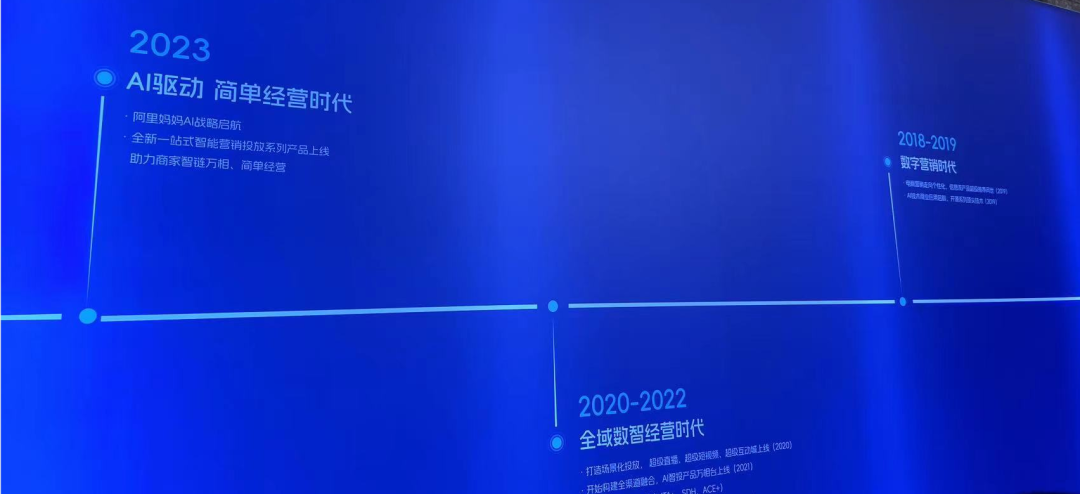
However, at the same time, new problems emerged—complex and diverse platform tools and application logic require many merchants to spend a lot of effort to understand and use.
Therefore, driven by AI technology, marketing in 2023 has also begun to seek to transition from full-domain digital management to simple management.
In terms of promotion and delivery, the current mainstream approach for e-commerce is a "three-step" process—first, through marketing decisions, determining how to allocate budgets across multiple channels; second, separate channel platform delivery; third, after delivery optimization, downloading data from multiple channels for correlation and analysis.
The serialized "three-step" process becomes very inefficient when it comes to cross-channel and multi-channel full-domain delivery.
Faced with complex procedures and tools, the best solution to simplify full-domain promotion is to be "one-stop." This requires new marketing tools to have three key capabilities—intelligence, controllability, and certainty.
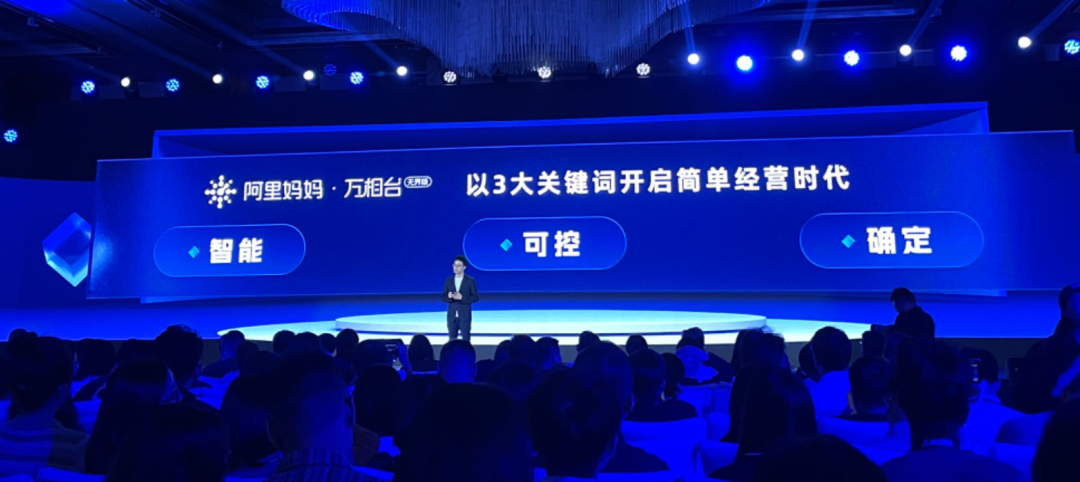
First, intelligence can simplify the promotion decision-making process, even to the extent of "one-click setup, effective everywhere."
For example, based on intelligence, the "Wanxiangtai Unbounded Edition" can not only actively help merchants learn from successful cases in the industry to solve store management, promotion, and scene selection issues.
The introduction of several major delivery capabilities simplifies operations significantly—multi-target direct delivery capability allows merchants to achieve direct delivery under the promotion mode without considering scene selection, but rather by choosing a combination of targets that align with the business's core objectives; brand-effect, audience, and product serialization delivery capabilities, combined with the delivery chain, can simplify operations by linking the entire serialized multi-channel touchpoints.
Of course, with "intelligent delivery decision-making," there also needs to be "controllable delivery." Controllability is reflected in cost control and effect control, meaning "money should not be spent blindly, and certainly not wasted."
Zheng Bo explained that through intelligent serialized delivery, compared to manual additional investment by merchants, there is a double-digit increase in ROI, and the accuracy of ROI precise delivery can also reach over 90%.
"The core value of the dual drive of intelligence and controllability lies in allowing merchants to achieve better certainty in their delivery," said Yuan Mu. This certainty comes from simpler management, more precise understanding of consumers, more certain cross-channel connections, and more certain and efficient achievement of business goals.
For brands, especially small and medium-sized brands, decision-making delivery tools with the three key capabilities can make new plan launches faster, store promotions more efficient, and major promotional deliveries more certain.
After using an AI marketing platform, the new tea drink brand "Tea Color and Joy" achieved a 50% conversion rate for new customers within 10 days, with a 20% increase in ROI. The small Italian fashion brand "crash baggage" achieved a 97.59% increase in ROI within three days through new product planning and one-stop product operation using an AI marketing platform.
Similarly, some brands using Youmi Cloud's one-stop e-commerce marketing big data analysis platform achieved a significant increase in efficiency in content distribution, reducing tedious operations from 3 hours to within 10 minutes, and a 300% increase in ROI within 30 days, with a 50% reduction in overall costs.
With the support of AI technology, marketing tools have been simplified, and marketing capabilities are upgrading from single-channel delivery to one-stop cross-channel brand-effect joint operation.
免责声明:本文章仅代表作者个人观点,不代表本平台的立场和观点。本文章仅供信息分享,不构成对任何人的任何投资建议。用户与作者之间的任何争议,与本平台无关。如网页中刊载的文章或图片涉及侵权,请提供相关的权利证明和身份证明发送邮件到support@aicoin.com,本平台相关工作人员将会进行核查。




